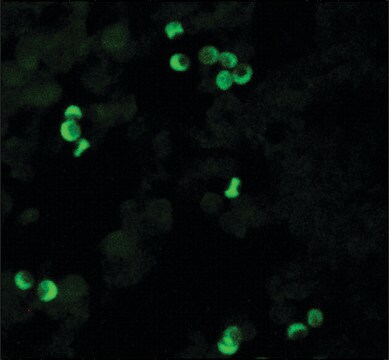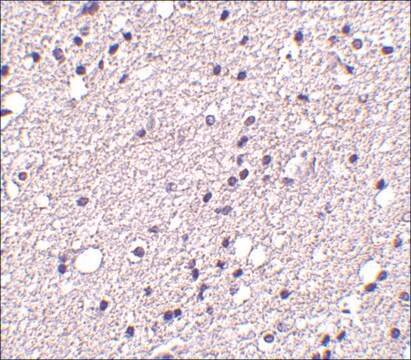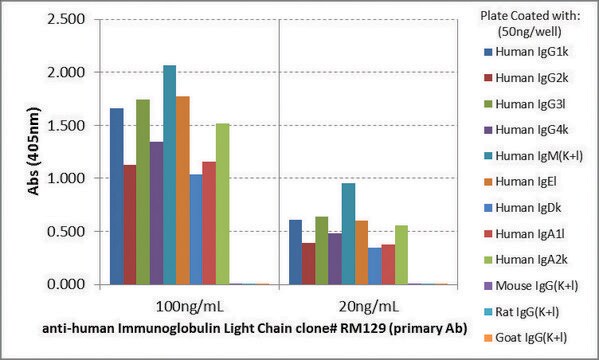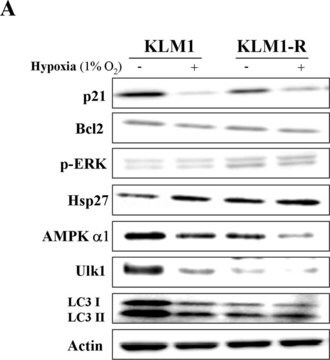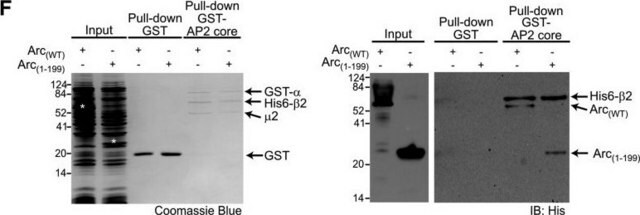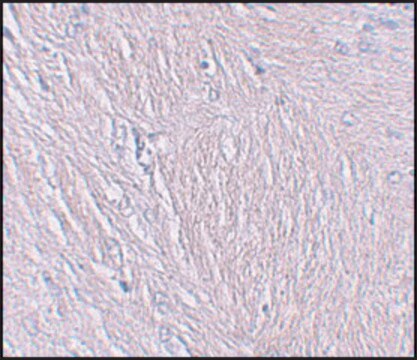SAB4700313
Monoclonal Anti-HLA-G-Biotin antibody produced in mouse
clone MEM-G/9, purified immunoglobulin, buffered aqueous solution
Iniciar sesiónpara Ver la Fijación de precios por contrato y de la organización
About This Item
Código UNSPSC:
12352203
NACRES:
NA.41
conjugado:
biotin conjugate
application:
FACS
clon:
MEM-G/9, monoclonal
reactividad de especies:
human
citations:
4
técnicas:
flow cytometry: suitable
Productos recomendados
origen biológico
mouse
Nivel de calidad
conjugado
biotin conjugate
forma del anticuerpo
purified immunoglobulin
tipo de anticuerpo
primary antibodies
clon
MEM-G/9, monoclonal
Formulario
buffered aqueous solution
reactividad de especies
human
concentración
1 mg/mL
técnicas
flow cytometry: suitable
isotipo
IgG1
Nº de acceso NCBI
Nº de acceso UniProt
Condiciones de envío
wet ice
temp. de almacenamiento
2-8°C
modificación del objetivo postraduccional
unmodified
Información sobre el gen
human ... HLA-G(3135)
Categorías relacionadas
Descripción general
The antibody MEM-G/9 reacts with native form of human HLA-G1 on the cell surface as well as with soluble HLA-G5 isoform in its beta2-microglobulin associated form. HLA-G belongs to the MHC Class I molecules (MHC Class Ib; nonclassical) and it is expressed on the surface of trophoblast cells. The antibody MEM-G/9 is standard reagent thoroughly validated during 3rd International Conference on HLA-G (Paris, 2003).
Histocompatibility leukocyte antigen–G (HLA-G), a naturally occurring immunosuppressive molecule, is located on human chromosome 6p21. HLA-G gene codes for a tolerogenic protein.
Histocompatibility leukocyte antigen–G (HLA-G), a naturally occurring immunosuppressive molecule, is located on human chromosome 6p21. HLA-G gene codes for a tolerogenic protein.
Inmunógeno
Recombinant human HLA-G refolded with beta2-microglobulin and peptide
Aplicación
The reagent is designed for Flow Cytometry analysis of cells expressing HLA-G molecule on the cell surface using a 1:1000 dilution. Indicated dilution is recommended starting point for use of this product. Working concentrations should be determined by the investigator.
Acciones bioquímicas o fisiológicas
Histocompatibility leukocyte antigen–G (HLA-G) plays an important role in preventing the activities of natural killer (NK) cell and inducing immune escape. It has the ability to block immune competent cells and innate and adaptive immune system. Mutations in the gene increases the risk of susceptibility to a wide range of inflammatory diseases, including asthma.
Características y beneficios
Evaluate our antibodies with complete peace of mind. If the antibody does not perform in your application, we will issue a full credit or replacement antibody. Learn more.
Forma física
Solution in phosphate buffered saline, pH 7.4, with 15 mM sodium azide.
Cláusula de descargo de responsabilidad
Unless otherwise stated in our catalog or other company documentation accompanying the product(s), our products are intended for research use only and are not to be used for any other purpose, which includes but is not limited to, unauthorized commercial uses, in vitro diagnostic uses, ex vivo or in vivo therapeutic uses or any type of consumption or application to humans or animals.
¿No encuentra el producto adecuado?
Pruebe nuestro Herramienta de selección de productos.
Código de clase de almacenamiento
10 - Combustible liquids
Punto de inflamabilidad (°F)
Not applicable
Punto de inflamabilidad (°C)
Not applicable
Elija entre una de las versiones más recientes:
¿Ya tiene este producto?
Encuentre la documentación para los productos que ha comprado recientemente en la Biblioteca de documentos.
Human Leukocyte Antigen-G Inhibits the Anti-Tumor Effect of Natural Killer Cells via Immunoglobulin-Like Transcript 2 in Gastric Cancer.
Wan R, et al.
Cellular Physiology and Biochemistry, 44(5), 1828-1841 (2017)
Recipient HLA-G+ 3142 CC genotype and concentrations of soluble HLA-G impact on occurrence of CMV infection after living-donor kidney transplantation.
Guberina H, et al.
International Journal of Molecular Sciences, 18(11), 2338-2338 (2017)
HLA-G molecules and clinical outcome in Chronic Myeloid Leukemia.
Caocci G, et al.
Leukemia Research, 61, 1-5 (2017)
Differential expression of HLA-E, HLA-F, and HLA-G transcripts in human tissue.
Wei X and Orr HT
Human immunology, 29(2), 131-142 (1990)
Ana S López et al.
Molecular immunology, 43(14), 2151-2160 (2006-02-24)
Dendritic cells (DC) are strong inducers of immunity but they can also be tolerogenic. During monocyte differentiation to DC the immunosuppressive indoleamine-2,3-dioxygenase (IDO) is induced. IDO degrades Trp to kynurenine, which is further metabolized to 3-hydroxyanthranilic acid. DC can also
Nuestro equipo de científicos tiene experiencia en todas las áreas de investigación: Ciencias de la vida, Ciencia de los materiales, Síntesis química, Cromatografía, Analítica y muchas otras.
Póngase en contacto con el Servicio técnico